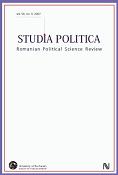Din istoria relaţiilor Bisericã-stat în perioada guvernãrii Antonescu. Cazul liderilor AGCOR
FROM THE HISTORY OF THE RELATIONS BETWEEN CHURCH AND STATE DURING THE GOVERNMENT OF MARSHAL ANTONESCU. THE CASE OF AGCOR LEADERS
Author(s): George EnacheSubject(s): History
Published by: Editura Universităţii din Bucureşti
Keywords: church; state; marshal Ion Antonescu; General Association of the Romanian Orthodox Church (AGCOR)
Summary/Abstract: During the period between the two World Wars, the relations between church and state evolved in an interesting way, from the verbal proclamation of a free cooperation between the religious groups and the Romanian authorities until an attempt of the government to impose an absolute control upon religious life. The ideology underlying this politic was the idea that the state was the sole regulator of the life of the nation and, therefore, the church had to fully submit to the commandments of the state. This politic led to a tendency to reduce the confessional diversity of Romania, based on the principle „one state, one church”. This principle became more and more influential during Antonescu’s rule, when the Romanian Orthodox Church was appointed as the official church and, to some extent, as the „unique” church supposed to guide the spiritual life of the Romanian nation. The adepts of other confessions, especially the Neo-protestants, were forced to embrace Orthodoxy. At first sight, the Orthodox Church was being honored and favored by these measures but, in fact, behind them laid hidden a tendency to cancel the autonomy of the church, acquired by big struggles after 1918. The brutal intrusion of Antonescu’s government in the life of the church was clearly instantiated by the way the authorities dealt with the leaders of the General Association of the Romanian Orthodox Church which, in 1942, were put under arrest only under the accusation that they hadn’t properly emphasized the role played by the state in ensuring the welfare of the church. The scandal that followed afterwards clearly evinced the attitude of the Romanian authorities towards the Orthodox Church, during those days.
Journal: Studia Politica. Romanian Political Science Review
- Issue Year: 7/2007
- Issue No: 3
- Page Range: 603-623
- Page Count: 21
- Language: Romanian

